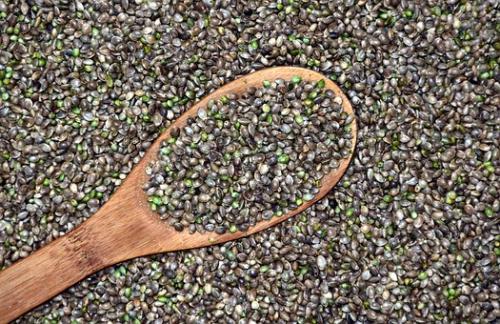Hemp could play a role in the development and expansion of a low carbon, environmentally responsible industry, bringing a new ‘cash-crop’ to Scottish agriculture and offering new job opportunities across the supply chain. This type of low carbon innovation is currently supported by the Scottish Government in the public sector (i.e. Can Do Challenge Fund and Civtech programmes) and through future Unblocking Ambition applications which seek to create businesses that support a low carbon economy, which will be a priority.
For the last eight years; Scottish Government funded research at the Rowett Institute has investigated various food crops which grow or have the potential to be grown in Scotland (e.g. Health Impacts of Sustainable Ingredient Selection in the Food and Drink Industry - Alternative Protein Study). Our work has had a particular focus on providing opportunities for the sector to diversify into new markets and has led to the development of a vast knowledge platform about the composition of these agricultural crops, as well as information on their nutritional efficacy and health benefits to humans.
Among these crops is agricultural hemp (Cannabis sativa L.). Hemp has an excellent nutritional profile being a rich source of protein (36%), dietary fibre (26%), healthy fats (6%) and micronutrient minerals such as magnesium, phosphorus, potassium, calcium and zinc. The knowledge gained from our research has enabled us to engage with, inform and support (e.g. Green Grow Club) various Scottish stakeholders such as farmers, Non-Governmental Organisations (NGO’s) (i.e. WWF), health professionals and the Scottish Food and Drink Industry.
Stakeholder engagement has subsequently led to the creation of the Scottish Hemp Group, bringing interested parties across the hemp supply chain together. The group, supported by Rural Innovation Support Services, currently includes farmers across Scotland (Kilburn Farm, Home Farm, Balring Farm, Castleton Fruit Farm, East Coast Viners), organisations such as Scottish Agricultural Organisation Society (SAOS), Scotland Food and Drink, Soil Essential Scotland, the Soil Association, and renewable energy and circular economy companies (Biosus and the Green Grow Co-op), as well as ourselves, SEFARI scientists from the Rowett Institute and Scotland’s Rural College. The group’s mission is to support and promote hemp in Scotland for food, feed, energy, biomaterials and as cash-crop promoter of circular green economies and new markets.
Besides contributing to dietary protein diversification, boosting daily fibre recommendations, hemp has numerous industrial applications; including bioplastics, composites, construction materials (building, cars), textiles, paper products, biofuel and graphene substitutes. Moreover, the production of hemp is carbon negative, meaning it absorbs more carbon from the atmosphere during growth than is emitted by the equipment used for harvest, process and transport. These aspects align with the Government’s ambitions for protecting Scotland’s future, including the current programme for early action to accelerate Scotland’s journey towards net zero.
Hemp has been a traditional part of Scotland’s industry and is suited to both the climate and the growing conditions in the main agronomic areas, especially parts of the Borders, East Lothian, Fife, Angus, Moray and the Black Isle. Apart from financial benefits directly for farmers and producers, hemp also brings environmental advantages due to its capacity for carbon sequestration, contributing to a greater biodiversity, land recovery and remediation.
Scotland is innovative, adaptable and has the collaborative drive to make the most of its agricultural resources. Hemp could contribute to economically viable solutions at a national level. We look forward to be a continued part of the Scottish Hemp Group which will play a pivotal role in creating, developing and expanding the local market. By bringing together organisations and Small and Medium Enterprises (SMEs) to deliver products that have economic opportunities together hopefully we can support Scotland’s strategy for addressing the emissions targets.
Dr Madalina Neacsu, Research Fellow, The Rowett Institute, University of Aberdeen.
Professor Wendy Russell, Personal Chair, The Rowett Institute. University of Aberdeen.
